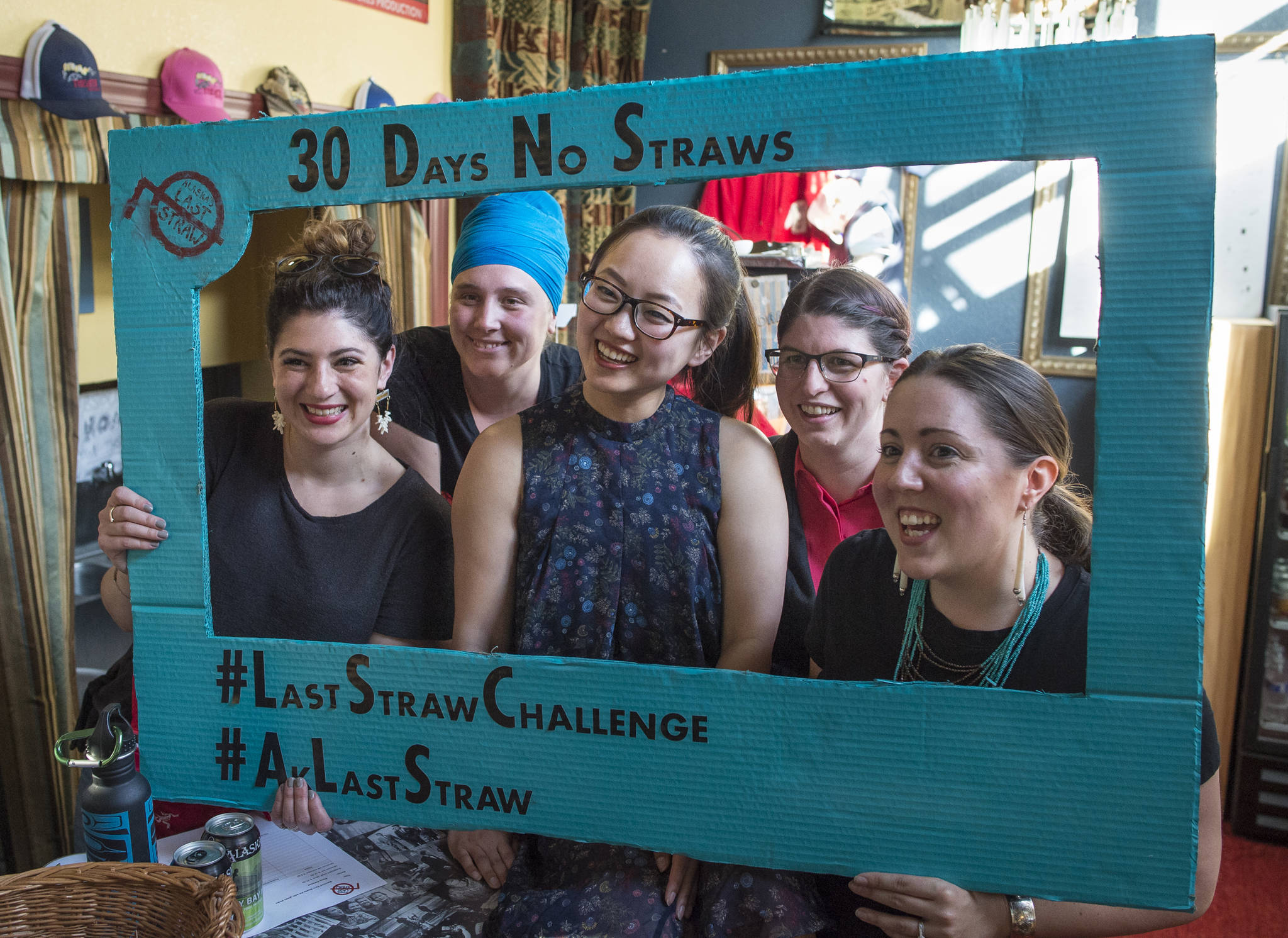The movement started in a sea turtle’s nostril.
Three years ago, a group of conservationists in Costa Rica pulled a struggling sea turtle from the water. A plastic straw had lodged in the long-living animal’s nose, disrupting its breathing and feeding.
The conservationists, a group which included two Ph.D. students studying in America, removed the straw. Fed up with the abundance of plastic trash in the ocean, the students posted the video on YouTube. More than 28 million have seen it to date, with reposts of the footage drawing millions more.
That tropical scene from 2015 played out on the screen Wednesday at Gold Town Nickelodeon, during a viewing of the documentary “Straws.”
“That turtle has become the poster child of a movement,” turtle researcher Nathan Robinson said.
Alaska’s Last Straw, a new environmental group, has brought that movement to Juneau. They want to rid the city of single-use plastic straws, one restaurant, bar and person at a time.
Plastics, which take decades or centuries to disintegrate in water, have become big hazards to ocean creatures, said group leader Stacey Katasse. Turtles get caught in lost fishing gear. Tuna digest bits of plastic glitter. Microscopic strands of plastic fibers — a staple in modern garments — wash out of clothes and into wastewater treatment facilities, making their way into the digestive tracts of small fish.
Lessening the use of plastics is one way to help, Katasse said. An easy first step is to end, or at least lessen, the amount of single-use plastic straws that end up in landfills. It’s estimated that more than 500 million plastic straws are used and disposed of daily in the United States, according to BeStrawFree. That doesn’t include many others sold and thrown away with juice boxes.
Alaska’s Last Straw is taking a grassroots approach to their mission of dropping that number, Katasse said: It’s about getting people to talk about their plastic use, and rewarding businesses that make the switch to paper straws. The group has put together kits of starter kits of paper straws for participating businesses. A social media campaign, #AKLastStraw and #LastStrawChallenge, encourages people to stop using plastic straws for 30 days.
Katasse, a computer programmer who has “always been drawn to the ocean,” said in an interview outside Gold Town that the idea came from a project for Wearable Arts. She wanted to do something incorporating single-use plastics to draw attention to the effect plastics are having on ocean health.
Her daughter challenged her to go further.
“I was talking about it with my daughter — we were going to do a piece on single-use plastic — and she asked the question, ‘How is that going to help?’ and I couldn’t answer the question,” Katasse said.
The conversation ended with the mother and daughter discussing environmental responsibility. “It ended with a conversation of, ‘What is enough? How do we get the message out?’ I said, this is enough, let’s start a movement,” Katasse added.
So Katasse formed Alaska’s Last Straw with a handful of friends and like-minded acquaintances. The goal is to do three things: sponsor events with paper straws, help businesses make the transition away from plastic and encourage individuals to go without plastic straws.
Participating businesses will receive a starter supply of paper straws and window stickers that alert people that they need to ask for a straw if they want one. The group is fundraising right now to pay for the kits.
Part of ending plastic straw use starts with individuals, Katasse said: businesses won’t use as many if people purposefully ask not to be served one. That kind of public pressure worked this week: in response to demands from customers, McDonald’s in the United Kingdom announced they’d phase out the use of plastic straws over time.
Several at the screening of “Straws” pledged to take the 30-day no straw the challenge. It’s easier for some than others. Hari Dev Singh Khalsa said he’s already stopped using most plastics with his food storage. He prefers glass; he doesn’t like the taste plastic imparts.
“Glass is one of the most common elements on Earth, all it takes is heat. And it’s recycleable, you can use it over and over and over,” Singh Khalsa said.
Asia Ver uses plastic straws and doesn’t really like the paper ones she’s tried. “They get kind of soggy,” she said. There are paper straws out there designed to last a little longer, and she’d be fine using those ones. Ver feels strongly about environmental issues, but said she doesn’t have as much time to dedicate to them.
“I feel like the straw thing is an easy start,” Ver said.
Most people don’t need a straw, said Jesse Patton, another person who has taken the challenge. She made the 30-day pledge at the GLITZ! drag show, which used paper straws this year with the help of Alaska’s Last Straw.
“I don’t have time much for activism. I try to make differences in my own actions and discussing my actions with people around me,” Patton said.
That’s all that Alaska’s Last Straw is asking, Katasse said. Single-use plastic is convenient, useful and hard to avoid. There’s no sense in getting overwhelmed by the broader goal Alaska’s Last Straw is marching toward. It’s best to start with smaller steps.
“People don’t need to be perfect. Eliminating single-use plastic is a huge undertaking and we don’t need to all change our lives all at once,” Katasse said.
• Contact reporter Kevin Gullufsen at kgullufsen@juneauempire.com. Follow him on Twitter at @KevinGullufsen.

